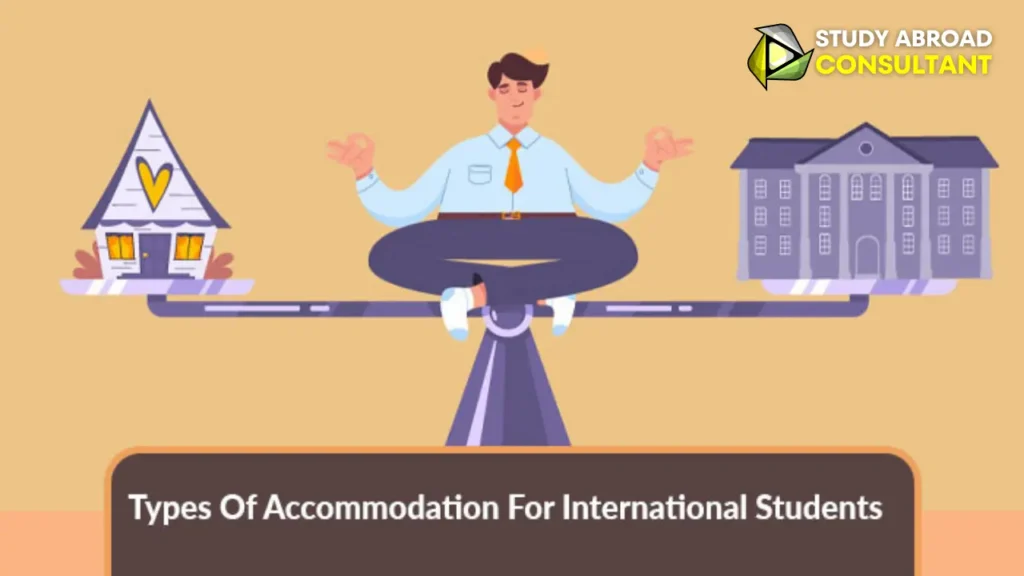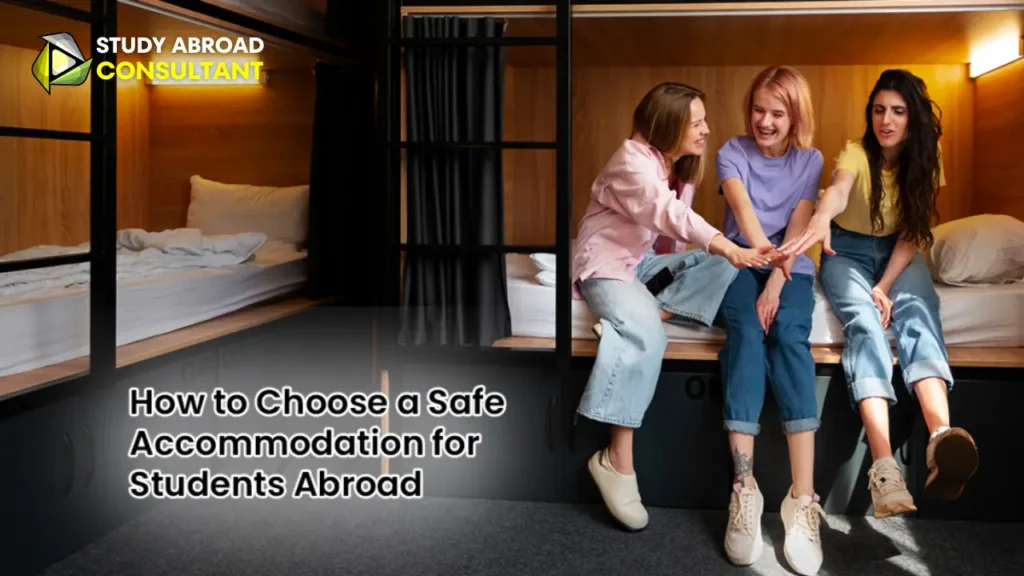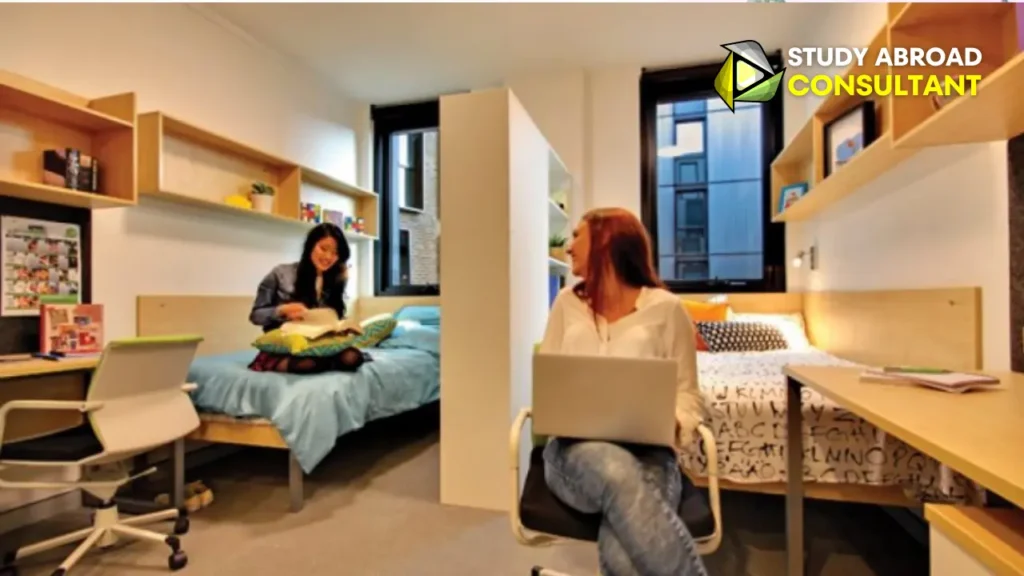For Pakistani students planning to study abroad, finding suitable accommodation is a crucial step in ensuring a comfortable and successful academic experience. Choosing the right accommodation services can significantly impact your overall well-being, academic performance, and cultural adjustment. This comprehensive guide explores the various accommodation options available, the factors to consider, and practical tips to help Pakistani students make informed decisions.
Types of Accommodation Services
1. University-Managed Accommodation
a. On-Campus Dormitories | Accommodation Services
On-campus dormitories, also known as halls of residence, are a popular choice among international students. These accommodations are usually located within or near the university campus, offering convenience and easy access to academic facilities.
Benefits:
- Proximity to classes, libraries, and other university facilities
- Opportunities to socialize with fellow students and participate in campus activities
- Often includes utilities and amenities such as internet, laundry facilities, and common areas
- Provides a safe and secure environment with university staff support
Drawbacks:
- Limited availability and higher demand
- May be more expensive than off-campus options
- Potential for noise and distractions due to communal living
b. University-Managed Apartments
Some universities offer managed apartments for students who prefer more independence. These apartments may be located off-campus but are still managed and maintained by the university.
Benefits:
- More privacy and independence compared to dormitories
- Fully furnished apartments with kitchen facilities
- Access to university support services
Drawbacks:
- Higher cost compared to on-campus dormitories
- May require commuting to campus
2. Private Accommodation
a. Private Apartments
Renting a private apartment is a popular choice for students who prefer independence and privacy. Private apartments can be found in various locations, ranging from city centers to suburban areas.
Benefits:
- Greater privacy and freedom
- Option to choose the location and type of apartment
- Potential for sharing with friends to reduce costs
Drawbacks:
- Requires finding and negotiating with landlords or rental agencies
- Responsibility for utility bills and maintenance
- May involve longer commutes to the university
b. Shared Houses
Shared houses, also known as house-sharing or flat-sharing, involve renting a house or apartment with other students. This option allows students to split the cost of rent and utilities.
Benefits:
- Cost-effective as expenses are shared
- Opportunities to build friendships and share responsibilities
- Flexibility in choosing housemates
Drawbacks:
- Potential for conflicts with housemates
- Shared common areas and facilities
- Requires cooperation and compromise

3. Homestays
Homestays involve living with a local host family. This option provides a unique cultural experience and a supportive home environment.
Benefits:
- Immersion in the local culture and language
- Home-cooked meals and family support
- Safe and nurturing environment
Drawbacks:
- Less privacy compared to other options
- Must adhere to host family rules and schedules
- Limited availability in some areas
4. Temporary Accommodation
Temporary accommodation options, such as hostels, hotels, and short-term rentals, are suitable for students who need a place to stay while they search for permanent housing.
Benefits:
- Flexibility in booking short stays
- Immediate availability upon arrival
- Convenient for initial settlement
Drawbacks:
- Higher cost for extended stays
- Limited space and amenities
- Not suitable for long-term living
Factors to Consider When Choosing Accommodation
1. Location
The location of your accommodation is a critical factor. Consider proximity to the university, public transportation, grocery stores, healthcare facilities, and other essential services. A convenient location can save time and reduce commuting costs.
2. Budget
Establish a budget for accommodation expenses, including rent, utilities, food, transportation, and other living costs. Compare different options to find the best fit within your budget. Remember to account for additional expenses such as security deposits and application fees.
3. Safety and Security
Safety is a top priority when choosing accommodation. Research the safety of the neighborhood and look for accommodations with security measures such as secure entry, CCTV cameras, and on-site security personnel. University-managed accommodations often provide a higher level of security.
4. Amenities and Facilities
Consider the amenities and facilities offered by the accommodation. Common amenities include internet access, laundry facilities, kitchen appliances, study areas, and recreational spaces. Access to these facilities can enhance your comfort and convenience.
5. Lease Terms and Conditions
Carefully review the lease terms and conditions before signing any agreement. Understand the duration of the lease, rent payment schedules, and policies on renewals, subletting, and early termination. Ensure that you are aware of your rights and responsibilities as a tenant.
6. Cultural Adjustment
Living in a new country involves cultural adjustment. Choose accommodation that supports your cultural needs and preferences. For example, homestays provide an immersive cultural experience, while shared houses with fellow Pakistani students can offer a sense of familiarity and community.

Tips for Finding and Securing Accommodation
1. Start Early
Begin your search for accommodation well in advance of your departure date. University-managed accommodations have limited availability, and private rentals may require time to find and secure.
2. Utilize University Resources
Take advantage of university resources such as housing offices, student unions, and online portals. Many universities provide assistance with finding accommodation and offer listings of available options.
3. Join Student Communities
Join online forums, social media groups, and student communities to connect with current and prospective students. These platforms can provide valuable insights, recommendations, and potential roommates.
4. Visit Accommodation in Person
If possible, visit the accommodation in person before making a decision. This allows you to assess the condition of the property, meet potential housemates or landlords, and get a feel for the neighborhood.
5. Verify Legitimacy
Be cautious of scams and fraudulent listings. Verify the legitimacy of the accommodation and rental agreements. Use reputable rental agencies and websites, and avoid making payments before signing a contract.
6. Consider Short-Term Options
If you are unable to secure long-term accommodation before arrival, consider short-term options such as hostels or hotels. This provides a temporary place to stay while you search for permanent housing.
7. Prepare Necessary Documents
Have all necessary documents ready for the accommodation application process. Commonly required documents include:
- Identification (passport or national ID)
- Proof of university enrollment or acceptance letter
- Financial proof (bank statements, scholarship letters)
- References from previous landlords or employers
8. Understand Local Rental Laws
Familiarize yourself with local rental laws and tenant rights in the host country. This knowledge can help you navigate the rental process and protect your interests.
Adjusting to Your New Accommodation
1. Set Up Your Living Space
Personalize your living space to make it feel like home. Bring essential items from Pakistan, such as bedding, kitchen utensils, and personal belongings. Decorating your room with familiar items can help ease homesickness.
2. Establish a Routine
Establish a daily routine to create a sense of normalcy and stability. Include time for studying, socializing, and self-care. A structured routine can help you manage your time effectively and reduce stress.
3. Build a Support Network
Build a support network by connecting with fellow students, housemates, and university staff. Participate in campus activities, join student organizations, and attend social events to meet new people and make friends.
4. Respect Cultural Differences
Be respectful of cultural differences and customs in your new environment. Embrace diversity and be open to learning about different cultures. This attitude will help you build positive relationships and enrich your experience abroad.
5. Communicate with Your Landlord or Host
Maintain open communication with your landlord or host family. Address any concerns or issues promptly and respectfully. Building a good relationship with them can make your stay more pleasant and trouble-free.

Conclusion
Finding the right accommodation services is a vital aspect of the study abroad experience for Pakistani students. By understanding the various options, considering important factors, and following practical tips, you can secure comfortable and suitable housing. Proper accommodation not only supports your academic success but also enhances your overall well-being and cultural adjustment. Embrace this exciting journey with confidence, knowing that you have made informed choices about your new home away from home.
Also Read : Interview Preparation for Pakistani Students to Study Abroad
FAQs about Accommodation Services for Pakistani Students to Study Abroad
1. What types of accommodation services are available for Pakistani students studying abroad?
Pakistani students have several accommodation services, including:
- University-Managed accommodation services: On-campus dormitories and university-managed apartments.
- Private accommodation services: Private apartments and shared houses.
- Homestays: Living with a local host family.
- Temporary accommodation services: Hostels, hotels, and short-term rentals for initial settlement.
2. How can I find university-managed accommodation services?
Most universities offer information about their accommodation services options on their official websites. You can also contact the university’s housing office or international student office for assistance. Apply early, as these accommodations often have limited availability.
3. What should I consider when choosing private accommodation?
When choosing private accommodation, consider the following factors:
- Location: Proximity to the university and essential services.
- Budget: Affordability of rent and additional costs like utilities.
- Safety: Security of the neighborhood and accommodation.
- Amenities: Availability of internet, laundry facilities, and other amenities.
- Lease Terms: Understanding the lease agreement and rental conditions.
4. How can I verify the legitimacy of a rental listing?
To verify the legitimacy of a rental listing:
- Use reputable rental websites and agencies.
- Check reviews and ratings.
- Visit the property in person if possible.
- Avoid making payments before signing a rental agreement.
- Be cautious of deals that seem too good to be true.
5. What documents are typically required for accommodation services?
Commonly required documents for accommodation services include:
- Identification (passport or national ID)
- Proof of university enrollment or acceptance letter
- Financial proof (bank statements or scholarship letters)
- References from previous landlords or employers
6. What is a homestay, and what are its benefits?
A homestay involves living with a local host family. Benefits of a homestay include:
- Cultural immersion and language practice.
- Home-cooked meals and family support.
- Safe and nurturing environment.
- Opportunity to experience local customs and traditions.
7. How can I find a shared house or flat-share?
You can find shared houses or flat-shares by:
- Joining online student forums and social media groups.
- Checking university bulletin boards and housing portals.
- Using dedicated flat-share websites and apps.
- Networking with other students.
8. What should I do if I face issues with my accommodation services?
If you face issues with your accommodation services:
- Communicate with your landlord, host family, or university housing office.
- Document the issues and keep records of any correspondence.
- Seek advice from your university’s student support services or legal aid if necessary.
9. How can I adjust to living in a new country and accommodation services?
To adjust to living in a new country and accommodation services:
- Personalize your living space with familiar items from home.
- Establish a daily routine to create stability.
- Build a support network by connecting with other students and participating in social activities.
- Respect and embrace cultural differences.
- Communicate openly with your housemates, landlord, or host family.
10. What should I know about local rental laws?
Familiarize yourself with local rental laws by:
- Researching tenant rights and responsibilities in the host country.
- Understanding the terms of your lease agreement.
- Knowing the process for handling disputes or issues with your landlord.
- Seeking advice from local tenant organizations or legal aid services.
11. How can I make my accommodation feel like home?
To make your accommodation feel like home:
- Bring personal items, such as photos, decorations, and bedding.
- Set up a comfortable study area.
- Cook familiar meals or explore local cuisine.
- Create a welcoming and organized living space.
12. What are the advantages of university-managed accommodation?
Advantages of university-managed accommodation include:
- Proximity to academic facilities and campus events.
- Included utilities and amenities such as internet and laundry.
- Opportunities to socialize with other students.
- Safe and secure environment with university staff support.
13. How can I save money on accommodation services costs?
To save money on accommodation services costs:
- Share accommodation services with other students to split expenses.
- Look for accommodations further from the city center.
- Compare different housing options and negotiate rent if possible.
- Use student discounts and offers for utilities and services.
14. What should I do if I arrive and haven’t secured permanent accommodation?
If you arrive without permanent accommodation services:
- Book temporary accommodation services such as a hostel or hotel.
- Use the time to visit potential long-term rentals in person.
- Seek assistance from your university’s housing office or international student services.
15. How do I handle cultural differences with housemates or host families?
Handling cultural differences involves:
- Open and respectful communication.
- Willingness to learn and adapt to new customs.
- Setting clear expectations and boundaries.
- Being patient and understanding of different perspectives.



